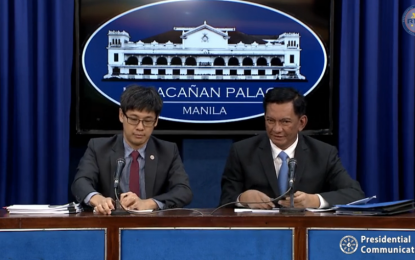
Finance Undersecretary Karl Chua and Albay Rep. Joey Salceda
MANILA -- The government is monitoring its oil supply from the Middle East in the wake of drone attacks on Saudi Arabia’s oil facilities over the weekend, a finance official said Wednesday.
Finance Undersecretary Karl Chua, however, said he is relying on Saudi Arabia’s promise that its oil supply will be back to normal by the end of the month.
“Iyong latest na nabasa ko sa news today is iyong supply bumalik na sa normal (The latest I read on the news today is the supply has returned to normal). So if that is the case, then wala po tayong impact sa ating (then it has no impact on our) oil supply and there is no further action needed,” Chua said in an economic briefing in Malacañan.
“We just have to monitor that the supplies that are coming from the Middle East are indeed adequate,” he added.
Albay Rep. Joey Salceda, chair of the House of Representatives Committee on Ways and Means, warned oil companies against taking advantage of the attack in Saudi Arabia to increase prices.
“Ang panawagan diyan ay iyong mga (Our request to) oil companies is, don’t take advantage of the windfall, (be)cause some of them are trying to price already their old inventories in the new one,” Salceda said.
“Kaya ang pakiusap ko lang po sa mga oil companies ay don’t exploit, kasi (That’s why my request to oil companies is don’t exploit because) I thought that the announcement of new price increases were a bit premature,” he added.
He urged oil companies to prove to the public that the oil they are selling was bought at the prices they have set.
The lawmaker further said oil companies that fail to comply will be disgorged.
“There’s a law on disgorgement. The disgorgement said you cannot profit – it’s undue enrichment, because we don’t have a windfall tax,” Salceda said.
He also assured that the administration would not make any “knee-jerk reflex reaction” in relation to suspending the excise tax on oil.
Under the Tax Reform for Acceleration and Inclusion (TRAIN) law, the government can suspend the implementation of the higher excise tax if oil prices in the world market hits USD80 per barrel for three consecutive months.
Energy Secretary Alfonso Cusi, meanwhile, also assured the public that there is “sufficient” oil supply to keep the economy running for the next 30 days.
Report showed that attacks on Saudi Arabia’s oil facilities decreased global supply by 5.7 million barrels per day, which is equivalent to 5 percent of the global supply. (PNA)
